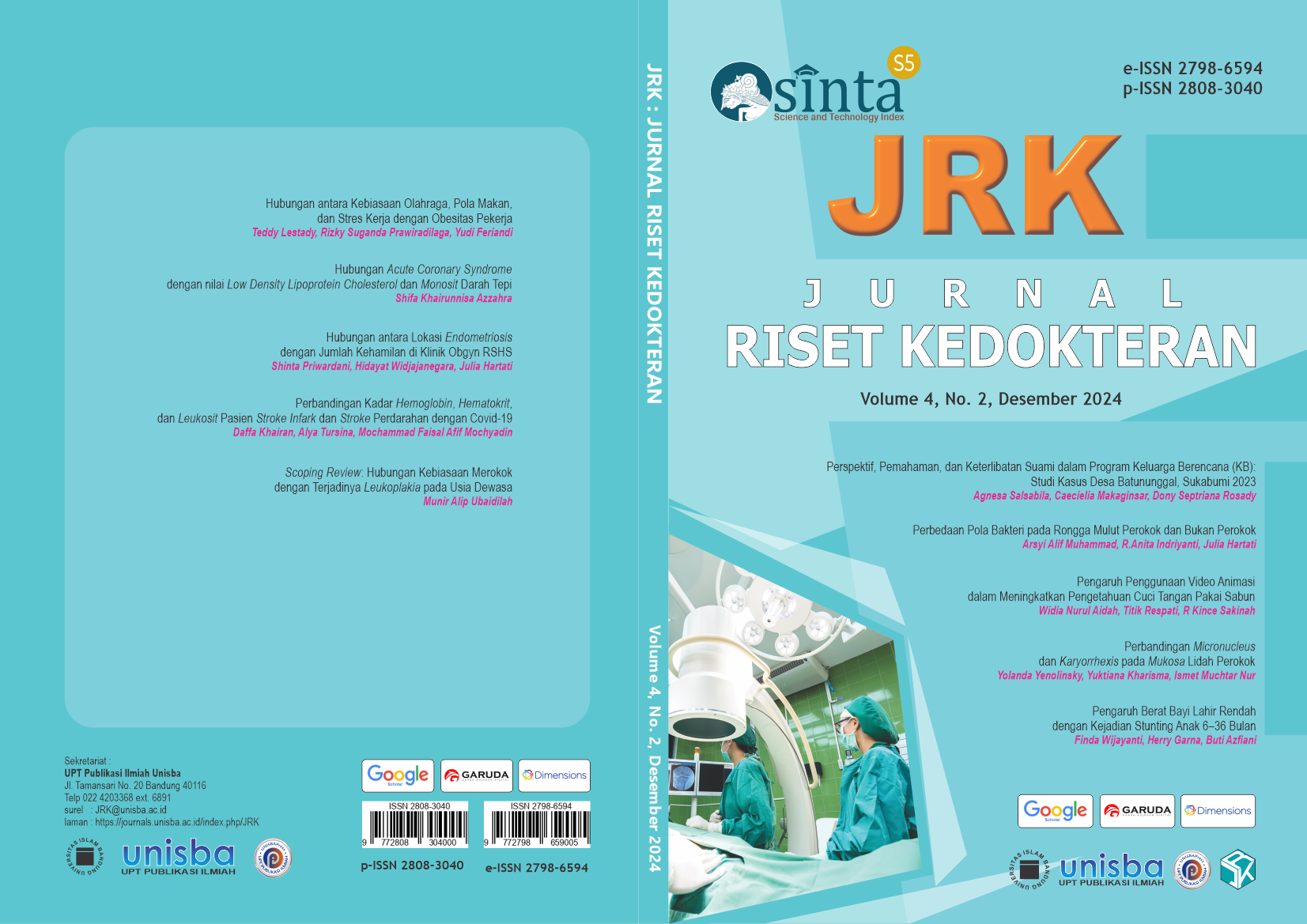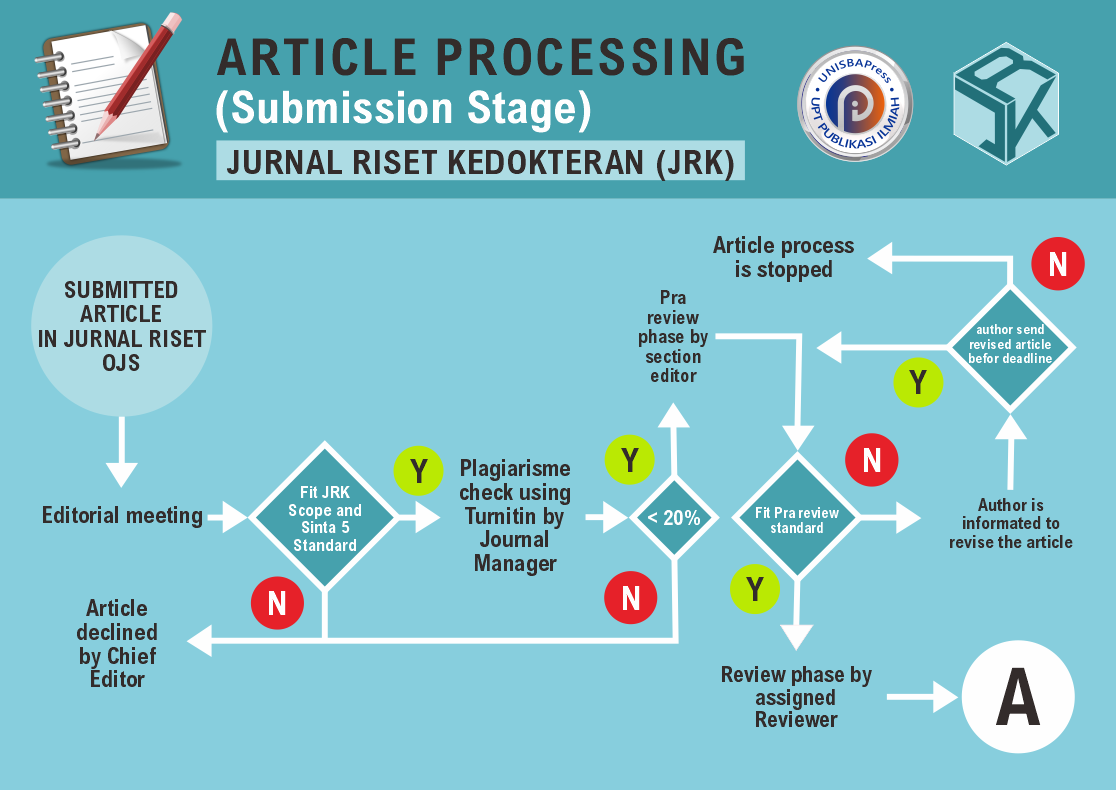Hubungan antara Kebiasaan Olahraga, Pola Makan, dan Stres Kerja dengan Obesitas Pekerja
DOI:
https://doi.org/10.29313/jrk.v4i2.5222Keywords:
Indeks Massa Tubuh, Obesitas, StressAbstract
Abstract. Obesity is an increasing global problem that negatively affects the health and productivity of individuals, especially at work. The main cause of obesity is the imbalance between physical activity and food intake. Work stress can also affect a person's intake. This study aims to determine the relationship between exercise habits, diet, and work stress with obesity in one of the work units of the Ministry of Energy and Mineral Resources in Bandung City. This analytical quantitative study used a cross-sectional approach on 70 workers selected through simple random sampling technique. Univariate data was analysed descriptively and buvariate analysis using Chi-Square test. The results showed that of the 70 respondents, (54%) had regular exercise habits, (90%) often consumed rice, (41.4%) often consumed noodles and sweet drinks, (51.4%) often consumed eggs, (93%) rarely consumed offal, and (77%) did not often consume fast food, (61.4%) often ate vegetables, (77%) often ate fruit, and (44.3%) were in the non-stressed category. Chi-Square test showed that there was no significant association between exercise habits, diet, and work stress with obesity (p-value > 0.05). This indicates that other factors such as genetics, individual metabolism, or other environmental factors may be more dominant in influencing obesity in this population.
Abstrak. Obesitas merupakan masalah global yang semakin meningkat saat ini dan berdampak negatif pada kesehatan serta produktivitas individu, khususnya dalam pekerjaan. Penyebab utama obesitas adalah ketidakseimbangan antara aktivitas fisik yang dilakukan dengan asupan makanan. Stres kerja juga dapat mempengaruhi asupan seseorang. Penelitian ini bertujuan untuk mengetahui hubungan antara kebiasaan olahraga, pola makan, dan stres kerja dengan obesitas di salah satu unit kerja Kementerian Energi dan Sumber Daya Mineral di Kota Bandung. Penelitian kuantitatif analitik ini menggunakan pendekatan cross-sectional pada 70 orang pekerja yang dipilih melalui teknik simple random sampling. Data univariat dianalisis secara deskriptif dan analisis buvariat menggunakan uji Chi-Square. Hasil penelitian menunjukkan bahwa dari 70 responden, (54%) memiliki kebiasaan olahraga rutin, (90%) sering mengonsumsi nasi, (41.4%) sering mengonsumsi mie dan minuman manis, (51.4%) sering mengonsumsi telur, (93%) jarang mengonsumsi jeroan, dan (77%) tidak sering mengonsumsi fast food, (61.4%) sering makan sayur, (77%) sering makan buah, dan (44.3%) berada dalam kategori tidak stres. Uji Chi-Square menunjukkan bahwa tidak terdapat hubungan signifikan antara kebiasaan berolahraga, pola makan, dan stres kerja dengan obesitas (p-value > 0.05). Hal ini mengindikasikan bahwa faktor lain seperti genetika, metabolisme individu, atau faktor lingkungan lainnya mungkin lebih dominan dalam mempengaruhi obesitas pada populasi ini.
References
Kementerian Kesehatan RI. Profil Kesehatan Indonesia 2022 [Internet]. Jakarta: Kementerian Kesehatan Republik Indonesia; 2023 Kementerian Kesehatan Republik Indonesia; 2023. Tersedia pada: https://kemkes.go.id/id/profil-kesehatan-indonesia-2022
WHO. Obesity and overweight [Internet]. 2021 [dikutip 5 Maret 2022]. Tersedia pada: https://www.who.int/news-room/fact-sheets/detail/obesity-and-overweight
Panjaitan JO, Aritonang EY, Sudaryati E. The Effect of Consumption Patterns and Physical Activity on the Incidence of Obesity in Bank Employees in Medan City. J Soc Res. 2023;2(6):1796-1818.
Tomiyama AJ. Stress and Obesity. Annu Rev Psychol. 2019;70:703-718. doi:10.1146/annurev-psych-010418-102936
Tim Kerja Hukum & Humas. Obesitas dan Produktivitas Kerja – RSUP Dr. Sardjito. October 30, 2019. Accessed July 30, 2024. https://sardjito.co.id/2019/10/30/obesitas-dan-produktivitas-kerja/
Goettler A, Grosse A, Sonntag D. Productivity loss due to overweight and obesity: a systematic review of indirect costs. BMJ Open. 2017;7(10):e014632. doi:10.1136/bmjopen-2016-014632
Church TS, Thomas DM, Tudor-Locke C, et al. Trends over 5 decades in U.S. occupation-related physical activity and their associations with obesity. PloS One. 2011;6(5):e19657. doi:10.1371/journal.pone.0019657
Warburton DER, Nicol CW, Bredin SSD. Health benefits of physical activity: the evidence. CMAJ Can Med Assoc J J Assoc Medicale Can. 2006;174(6):801-809. doi:10.1503/cmaj.051351
Swift DL, Johannsen NM, Lavie CJ, Earnest CP, Church TS. The role of exercise and physical activity in weight loss and maintenance. Prog Cardiovasc Dis. 2014;56(4):441-447. doi:10.1016/j.pcad.2013.09.012
Hu FB, Malik VS. Sugar-sweetened beverages and risk of obesity and type 2 diabete. Sugar-sweetened beverages and risk of obesity and type 2 diabetes: Epidemiologic evidence. Physiol Behav. 2010;100(1):47-54.
Malik VS, Popkin BM, Bray GA, Després JP, Hu FB. Sugar Sweetened Beverages, Obesity, Type 2 Diabetes and Cardiovascular Disease risk. Circulation. 2010;121(11):1356-1364. doi:10.1161/CIRCULATIONAHA.109.876185
Mozaffarian D, Hao T, Rimm EB, Willett WC, Hu FB. Changes in Diet and Lifestyle and Long-Term Weight Gain in Women and Men. N Engl J Med. 2011;364(25):2392-2404. doi:10.1056/NEJMoa1014296
Brunner EJ, Chandola T, Marmot MG. Prospective effect of job strain on general and central obesity in the Whitehall II Study. Am J Epidemiol. 2007;165(7):828-837. doi:10.1093/aje/kwk058
Kivimäki M, Singh-Manoux A, Nyberg S, Jokela M, Virtanen M. Job strain and risk of obesity: systematic review and meta-analysis of cohort studies. Int J Obes 2005. 2015;39(11):1597-1600. doi:10.1038/ijo.2015.103
Nyberg ST, Fransson EI, Heikkilä K, et al. Job strain and cardiovascular disease risk factors: meta-analysis of individual-participant data from 47,000 men and women. PloS One. 2013;8(6):e67323. doi:10.1371/journal.pone.0067323.













